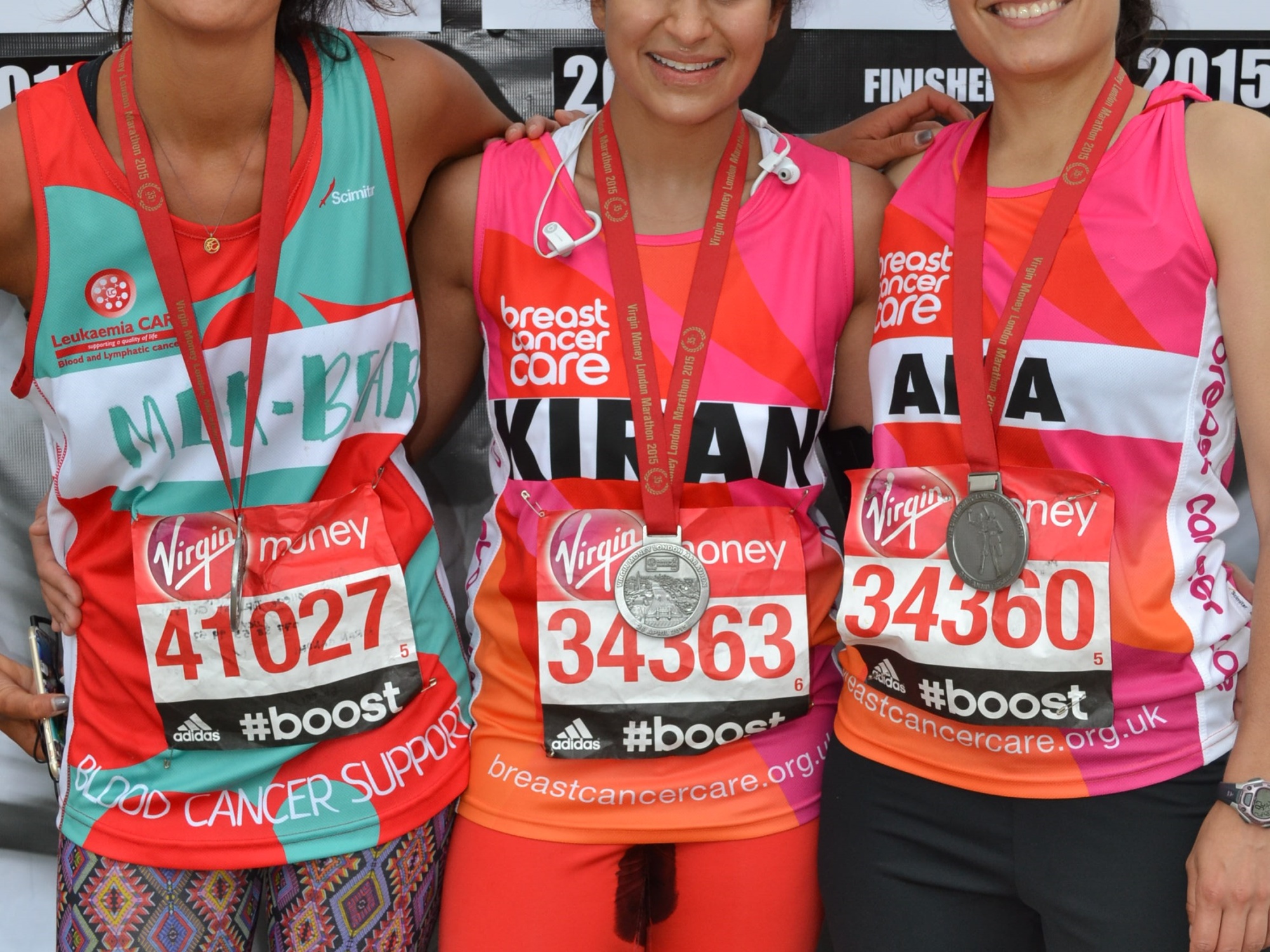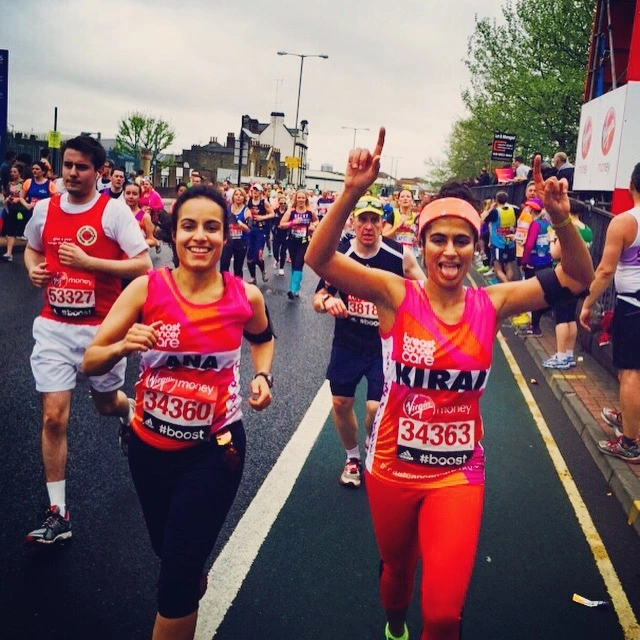Check a revised version of this piece on Absurdist.
The marathon was everything. I trained for a year and then it happened. And truly it was one of the most profound experiences of my life. I ran with two of the most important women in my life, and we didn’t leave each other’s side once, from start to finish. We crossed the finish line hand-in-hand. We raised $6,000 collectively for Breast Cancer Care. And we ran the whole way without stopping. London in particular is one of the world’s best marathons because so many people come out for it – the sidelines are packed for the entire 26.2 miles and Londoner’s signs are hilarious. There are crazy people running without shoes and with tutus and with 40 pounds on their back and there are dance parties along the way. If I had to summarize though, the marathon for me was about family & feminism.
FAMILY: My dad and brother came out and it was the best – my dad made cheer t-shirts and they both wore them and came out to all the breast cancer cheer points at miles 9 and 18.5! Ana’s mom and sister were there too and supported us with the best screams and hugs ever throughout the race! I remember segmenting parts of the marathon in my head: get to mile 6, then to mile 9 to see family, then the half marathon point at 13.1, then to mile 18.5 to see my family and the breast cancer cheer point again, and then the final stretch to 26.2. At the end of the marathon we were greeted by so many of our London-based friends at the Breast Cancer afterparty at the Sofitel hotel – it was so well-organized and fun and family-oriented and really just so magical and special. The main message I walked away from this experience was how much being there for someone else in a totally selfless way can carry them through a difficult time. I felt their support and that bond is now for life.
FEMINISM: I RAN THE WHOLE MARATHON WITH MY PERIOD BLOOD RUNNING DOWN MY LEGS. I got my flow the morning of and it was a total disaster but I didn’t want to clean it up. It would have been way too uncomfortable to worry about a tampon for 26.2 miles. I thought, if there’s one person society won’t fuck with, it’s a marathon runner. If there’s one way to transcend oppression, it’s to run a marathon in whatever way you want. On the marathon course, sexism can be beaten. Where the stigma of a woman’s period is irrelevant, and we can re-write the rules as we choose. Where a woman’s comfort supersedes that of the observer. I ran with blood dripping down my legs for sisters who don’t have access to tampons and sisters who, despite cramping and pain, hide it away and pretend like it doesn’t exist. I ran to say, it does exist, and we overcome it every day. The marathon was radical and absurd and bloody in ways I couldn’t have imagined until the day of the race.
Women from a young age are told that their main value to society is that they must look beautiful, consumable, f*ckable. A period doesn’t fit into this category, so it is made taboo. So much so that parents have an awkward time discussing it with children, period commercials are all about concealing yourself or saving yourself from “embarrassment” (they don’t even show blood in a commercial about blood! they show a metaphorical blue liquid…!?) and girls are quiet about periods when other boys are nearby, even though it should be something to be ashamed of. Girls are taught starting from such a young age how to exaggerate what society has deemed “beautiful” and how to hide what we have decided is not beautiful, aka, not sexually consumable or enjoyable. While I am not advocating for free-bleeding, I am advocating for it to be ok for women to speak comfortably and honestly about their own periods, to ask for medicine and not have to pretend they have a “stomach ache” when indeed they are experiencing menstrual cramps, to not fear that someone will make fun of them for PMSing instead of asking how to help out, and to ask for a short break at the office if that’s what they need to deliver their best work. Steve Jobs and Mark Zuckerberg have both said at some point in their careers that the reason they wear almost identically the same outfit every day is so as to have one less decision to make daily that thus frees up mental capacity to handle one more decision relating to their work. Just think, women daily have to worry about hair, make-up, weight, clothing, shoes, periods, general desirability…instead of being given the freedom to just get on with their work. When we aren’t beautiful we aren’t as desirable even when we are awesome at our jobs, and when we are super beautiful, we aren’t taken seriously. Women, biologically, are given traits that are attractive. We don’t need any more. We have things like eyelashes or hair or breasts that are already feminine traits that make us naturally attractive. We should be able to love these things of ourselves, eat healthily, and focus on our passions and work. Periods fit into this conversation because the reason there is stigma around it is that it is not sexy, and therefore not acceptable to talk about. For this reason, my marathon run was about reclaiming the fact that it is not my job to look sexy for others’ public consumption. My job on the marathon course was about choosing what was right for me in that moment, and completing the 26.2 mile race in the safest and healthiest way possible for my body.
In the developing world, it is even worse. I don’t know why we don’t link women’s economic oppression to period stigma more directly. In my mind, this is the pattern I see: girls are not allowed to talk about or reveal that they experience a monthly biological process called menstruation. We then make it extremely expensive, unsustainable and inaccessible to actually conceal it – pads are a luxury for most rural communities, and tampons are not a practical solution for most societies that are extremely protective of women’s virginity – this kind of penetration would not be encouraged or allowed. By making it difficult to take care of because we make it hard to talk about and expensive to clean up, most girls end up just staying at home monthly, missing school and growing up to feel shame around their bodies, instead of confident. In missing school, they don’t graduate with the same education and information that the boys do, and are immediately put at both an economic disadvantage but also an emotional one – if you feel you don’t have any power, you will act like you don’t have any power. This can happen to anyone – regardless of gender. It perpetuates a cycle of women having low self-esteem, lack of information and lack of physical and emotional resources to lift themselves out of poverty.
Although menstruation stigma is only one of many systemic factors that perpetuate gender inequality, I find it to be a rather large one that we frequently ignore. My run was about using shock factor to create dialogue around menstrual health and comfort, so that women can start to own the narrative of their own bodies. Speaking about an issue is the only way to combat its silence, and dialogue is the only way for innovative solutions to occur.
I could never have expected the international viral reaction that resulted online several months after my race. This reaction taught us two things: that period stigma runs deep and that we have a lot of work to do as a society to build together a world that is more loving and inclusive of women’s bodies.
http://c.brightcove.com/services/viewer/federated_f9?isVid=1
Below are photos from the course and beyond.






































